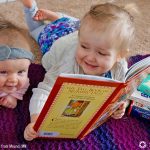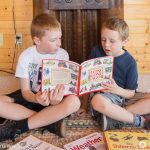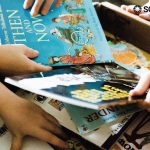Last Thursday, Sonlighter Hannah Keeley interviewed me for her radio show. While she asked a host of great questions, I found her final one particularly intriguing: "Can you give me a big picture overview of what you think education is?"
This is a question that we as parents, homeschoolers and non-homeschoolers alike may seldom think about. Too often we may choose to send our children off to school assuming that traditional schools have a united and sound answer to this question. I am not certain they do. I also wonder if most of us who homeschool have thought deeply enough about this question. After Hannah asked me, I've decided this is a question I need to ask myself every year.
The following is (something like) what I said in response to Hannah's intriguing question:
As home educators, we must teach at least the Three R's--readin', 'ritin' and 'rithmetic.
Within reading, we must provide our students a wide variety of material to expand their cultural literacy. In E.D. Hirsch's book, Cultural Literacy, he describes two very basic, simple reading assignments teachers gave a group of junior college students. The first assignment discussed "love" in a generic manner. All the students were able to decode all the words in the assigned article and, since "love" is something almost everyone has some knowledge of, all were well able to respond to the comprehension questions.
The second assignment, however, had to do with the meeting between generals Robert E. Lee and Ulysses S. Grant at the Appomattox Court House in April of 1865. All the students could decode (i.e., "read") all the words in the article. But some students were culturally illiterate—some didn't even know that the Civil War had taken place, much less when it occurred or that Lee and Grant were the key generals on the opposing sides. These students were completely lost. The article simply "didn't make sense" to them. They were unable to interpret what they were reading and, therefore, were unable to answer basic comprehension questions about what they read.
Hirsch states that authors assume their readers have enough background information to understand what they are writing. Based on the study of these junior college students, however, it is clear that people who are not widely read can struggle with even the most basic texts.
Therefore, to be well-educated, students must read materials covering a wide range of subject matter.
We must encourage our children to write clearly and well.
I read recently that if two candidates for a job seem equally qualified, the Human Resources person should hire the one who writes better. Much of the working world relies on well-written communication.
Regarding math, we should help our children achieve the highest level of math mastery that they can. Many careers require a strong foundation in mathematics.
But, from my perspective, quality education encompasses so much more than the Three R's.
As parents, we must train our children to love the Lord. We should read the Bible with our children daily and require them to memorize passages. Young children memorize much more easily than adults, so draw on that reality.
May we strive to provide our children with heroes—ordinary people whom God has used to impact the world. Read biographies and encourage your children to attempt great things for God.
Help your children understand history. To effectively live in today's world, we need to study and learn from the history that has gone before.
We must train our children to think. While textbooks help expose students to cultural literacy topics (that, hopefully, they remember after reading), I fear that textbooks authored by one person (or a small team) come across as too authoritative. I believe children read textbooks and believe that the information included must all be "true." On the other hand, when students read a wide variety of books by diverse authors, they are forced to critically evaluate the text they read. I believe that is a valuable life skill. May our children read the newspaper or listen to the news carefully, with the ability to discern the biases of the authors, the "spin," the truth and the error.
While electives, of course, are optional, we can use them to help our children discern their strengths and career interests. I didn't know my daughter Jonelle had an art aptitude until she took an art class. She ended up as an art major in college and has enjoyed a successful career in something I would have never imagined had she never taken that optional, "stray" class!
And, finally, we want to raise up children who love to learn. We don't want our children simply to have heads stuffed full of facts, children who "finish" school and never crack a book again. May we and our children be people who consistently learn new things.
I ended there in my answer to Hannah, but I plan to think more about this. Would you join me? I'd greatly appreciate hearing your thoughts on this big idea.
Blessings,
Sarita







[…] this post, I'm going to set aside the more basic questions of what is education, what makes a great education, and what are the best ways to acquire such an […]